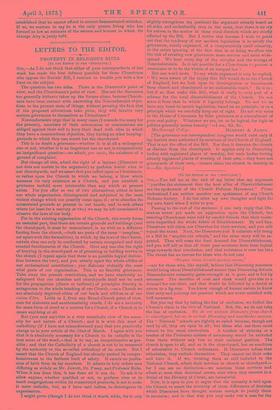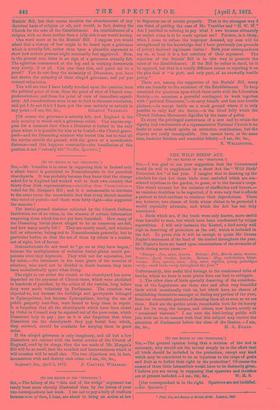[TO THE EDITOR OF THE "SPECTATOR']
Sin,—You tell me at the end of my letter that my argument "justifies the statement that the best allies of Disestablishment are the spokesmen of the Church Defence Movement." Please understand I am neither member nor spokesman of any Church Defence Society. I do but utter my own thoughts and fight for my own hand when I write to you.
Passing to the rest of the sentence, I can only reply that Dis-
senters never yet made an aggression upon the Church, but resisting Churchmen were told by candid friends that their resist- ance imperilled the whole fabric of Establishment. By and bye, Dissenters will claim our Churches for their services, and you will repeat the taunt. Next, the Dissenters and S ,cularists will bring in a Bill to "acquire our schools," and the same story will be re- peated. Then will come the final demand for Disestablishment, and you will tell us that all these past measures have been logical steps towards that conclusion, and that resistance is now too late The threat has no terrors for those who do not care
"Proptor vitam vivoudi perclore causas,"
—nor for those who, like myself, believe that Dissenting successes would bring about Disestablishment sooner than Dissenting defeats. Nonconformist animosity gains strength as it goes, and is fed by successes. The sacrifice of coat and cloak would give rise to a demand for our shirt, and that would be followed by a denial of access to a fig-tree. You know enough of human nature to know that envy and jealousy are passions which are never satisfied with half -measures.
But you say that by taking the line of exclusion, we forfeit the Church's claim to the title of National. Bat, Sir, we do not take the line of exclusion. We do not exclude Dissenter: from church or churchyard, but we do exclude Dissenting and unorthodox services. The " National " schools are rightly so called because, though not used by all, they are open to all ; but those who use them must submit to the usual curriculum. A teacher of alchemy or a teacher of the Ptolemaic system of astronomy would be excluded from them without any loss to their national position. The
church is open to all, and so is the churchyard, but on condition of submission to Church ordinances. If Dissenters refuse that submission, they exclude themselves. They cannot eat their cake and have it. If we, treating them as still included in the National Church, admit their services in church or churchyard— for I can see no distinction—we sanction those services and admit at once that doctrinal errors, even when they amount to a denial of the Divinity of Christ, are immaterial.
Now, it is open to you to argue that the necessity is laid upon the Church to assert the triviality of those differences of doctrine which Dissenters have thought serious enough to justify theni in secession ; and in that way you may make out a case for the
Burials' Bill, but that course involves the abandonment of any doctrinal basis of religion at all, and would, in fact, destroy the Church for the sake of the Establishment. An establishment of a religion with no more outline than a jelly-fish is not worth having.
One word more as to the Burials' Bill. I suppose you would admit that a change of law ought to be based upon a grievance which is actually felt, rather than upon a plausible argument to show how certain persons might reasonably feel aggrieved. Now, in the present case there is no sign of a grievance actually felt. The agitation commenced at the top and is working downwards very slowly, if at all. Can you deny this, and point me to a proof? You do not deny the animosity of Dissenters, you have not shown the actuality of their alleged grievance, and yet you counsel submission.
You will see that I have briefly touched upon the question from the political point of view, from the point of view of Church com- prehensiveness, and from the point of view of immediate expedi- ency. All considerations seem to me to lead to the same conclusion, and yet I do not think I have put the case unfairly or untruly in [Of course the grievance is actually felt, and England is the only country in which such a grievance exists. Can anyone sup- pose for a moment that when a Dissenter is buried in the only place where it is possible for him to be buried—the Church grave- yard—and the Dissenting minister who buries him has to read all the service outside the ground, with the grave at a considerable distance—and this happens constantly—the humiliation of this position is not "actually felt" ?—En. Spectator.]



































 Previous page
Previous page